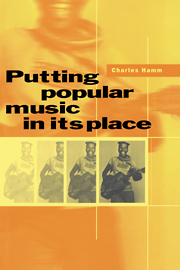Book contents
- Frontmatter
- Contents
- Acknowledgements
- Preface
- 1 Modernist narratives and popular music
- 2 Rock and the facts of life
- 3 Changing patterns in society and music: the US since World War II
- 4 “If I Were a Voice”: or, The Hutchinson Family and popular song as political and social protest
- 5 Some thoughts on the measurement of popularity in music
- 6 Elvis, a review
- 7 Home cooking and American soul in black South African popular music
- 8 Rock ‘n’ roll in a very strange society
- 9 African-American music, South Africa, and apartheid
- 10 “The constant companion of man”: Separate Development, Radio Bantu, and music
- 11 Privileging the moment of reception: music and radio in South Africa
- 12 Music and radio in the People's Republic of China
- 13 Towards a new reading of Gershwin
- 14 A blues for the ages
- 15 Graceland revisited
- 16 Dvořák in America: nationalism, racism, and national race
- 17 The last minstrel show?
- 18 The Role of Rock, a review
- 19 Genre, performance, and ideology in the early songs of Irving Berlin
- 20 Epilogue: John Cage revisited
- Index
11 - Privileging the moment of reception: music and radio in South Africa
Published online by Cambridge University Press: 05 February 2012
- Frontmatter
- Contents
- Acknowledgements
- Preface
- 1 Modernist narratives and popular music
- 2 Rock and the facts of life
- 3 Changing patterns in society and music: the US since World War II
- 4 “If I Were a Voice”: or, The Hutchinson Family and popular song as political and social protest
- 5 Some thoughts on the measurement of popularity in music
- 6 Elvis, a review
- 7 Home cooking and American soul in black South African popular music
- 8 Rock ‘n’ roll in a very strange society
- 9 African-American music, South Africa, and apartheid
- 10 “The constant companion of man”: Separate Development, Radio Bantu, and music
- 11 Privileging the moment of reception: music and radio in South Africa
- 12 Music and radio in the People's Republic of China
- 13 Towards a new reading of Gershwin
- 14 A blues for the ages
- 15 Graceland revisited
- 16 Dvořák in America: nationalism, racism, and national race
- 17 The last minstrel show?
- 18 The Role of Rock, a review
- 19 Genre, performance, and ideology in the early songs of Irving Berlin
- 20 Epilogue: John Cage revisited
- Index
Summary
Originating as a paper delivered at a conference organized by Steve Scher at Dartmouth College in May of 1988, this essay attempts to discover the meaning of a single piece of music in a single, specific historical setting. In a critique of the papers from this conference, Hayden White writes:
The question of the relation of the musical work to its historical context is raised in a variety of ways in this volume, but most explicitly and most radically by Charles Hamm, John Neubauer, and Peter Rabinowitz. … These three critics take their point of departure from the postmodernist notions of the openness of the work of art and of the function of the performer and/or audience in the production of the work's possible meaning. … In his consideration of the reception in black South Africa of Lionel Richie's “All Night Long (All Night),” Hamm first stresses the difficulty of imputing any specific meaning to the work itself. … Specific meanings are produced, Hamm says, “only at the moment of reception” and are “shaped by the cultural capital of the listener.” … The implications of Hamm's position could be unsettling to critics, I should think. According to Hamm, the critic's role would not consist of determining the real or true value of a given musical work, but rather – insofar as one were interested in meaning at all – in identifying the contexts in which it may have been heard and surveying the various meanings imputed to it by listeners in those contexts.
- Type
- Chapter
- Information
- Putting Popular Music in its Place , pp. 249 - 269Publisher: Cambridge University PressPrint publication year: 1995

